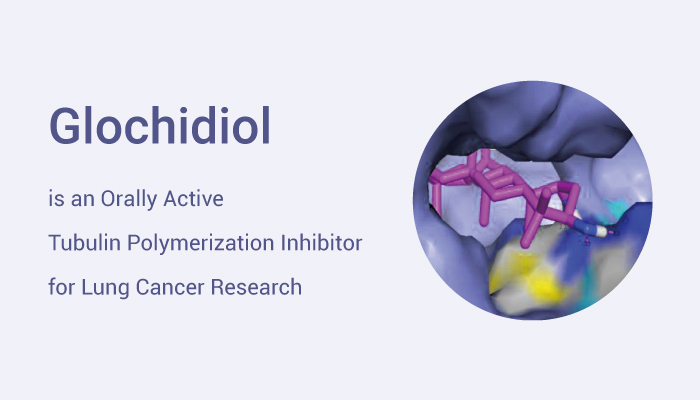Tubulin is the protein that polymerizes into long chains or filaments that form microtubules, hollow fibers which serve as a skeletal system for living cells. Importantly, Tubulin includes α- and β-tubulin and polymerizes into dynamic microtubules. Particularly, Tubulin plays important roles in various cellular processes including spindle formation, apoptosis, and intracellular transportation. Specifically, Research shows that tubulin polymerization inhibitors have been discovered as potent anticancer agents.
Lung cancer is one of the most common cancers and results in significant mortality worldwide. Meanwhile, The 5-year survival of patients with lung cancer is extremely low compared with other cancers. So it is important to find an anticancer agent for lung cancer.
This article will introduce a potent tubulin polymerization inhibitor for lung cancer, Glochidiol.

Glochidiol is a natural triterpenoid and also is a tubulin polymerization inhibitor with an IC50 value of 2.76 μM. Besides, Glochidiol (0-20 µM; 48 h) shows potent antiproliferative activity against lung cancer cell lines NCI-H2087, HOP-62, NCI-H520, HCC-44, HARA, EPLC-272H, NCI-H3122, COR-L105 and Calu-6 with IC50 values of 4.12 µM, 2.01 µM, 7.53 µM, 1.62 µM, 4.79 µM, 7.69 µM, 2.36 µM, 6.07 µM and 2.10 µM, respectively. Meanwhile, Glochidiol (1, 1, 5 µM) decreases the expression of EBI (N, N’-ethylenebis(iodoacetamide)) (100 µM):β-tubulin adduct in a dose-dependent manner. These results indicate that glochidiol directly binds to the colchicine binding site in βtubulin.
Glochidiol (0.2, 60 mg/kg/day; i.g.; 21 days) decreases average tumor weight and relative tumor volume with no obvious cytotoxic effect on the major organs, including heart, liver, and kidney in HCC-44 xenograft tumor growth in nude mice.
All in all, Glochidiol is an orally active tubulin polymerization inhibitor. Besides, Glochidiol shows antiproliferative and anticancer activity.
Reference:
[1] Chen H, et al. Invest in New Drugs. 2021 Apr;39(2):578-586.